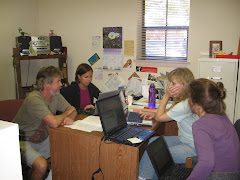The Moodle is my Spem in alium; Renee is my Thomas Tallis.
Just for the record, my interest in the music of Thomas Tallis, musical star of the English Renaissance, has been recently rekindled by the Showtime series The Tudors, in which Tallis is a significant character and his music is regularly featured. His story line is an interesting counterpoint to the intense relationship between Henry VIII and Ann Boleyn and the king's struggles to get a divorce from his first wife Catherine. While my interest in Henry's sex life faded quickly after the series ended, I am now a regular listener to Tallis's masterpieces, including the motet Salve intemerata, the Mass Missa salve intemerata and the remarkable forty-voice motet Spem in alium.
This is the story about Spem in alium : apparently, an Italian composer, Alessandro Striggio, visited England in 1567 during the reign of Elizabeth I. He conducted for his hosts a performance of a motet in forty parts, Ecce beatam lucem. Someone at court, according to the legend, wondered aloud if there wasn't a domestic composer who could match such an achievement. Tallis took up the challenge - and a challenge it was; if you are familiar with the complexities of four-part harmony, imagine something ten times as intricate, forty independent voices singing together.
The Moodle is my Spem in alium; Renee is my Thomas Tallis.
The opening couplet of the text which Tallis set for this piece is as follows:
Spem in alium nunquam habui
praeter in te, Deus Israel,
which may be rendered as
I have never put my hope in another
except in thee, God of Israel,
Well, I certainly did not put my hope in thee, O Moodle. In fact, I was nervous and suspicious of thy complexities and digital challenges. I did, however, put my hope in Renee, my partner in this project. I knew she would be fearless, and she has been so; I knew she would be creative, and she has been so; I knew she would be supportive and persistent and loyal to our principles and she has been all of these also. She has taken the forty (or so) individual voices on the Moodle and made them sing together in rich and moving harmony.
The Moodle is my Spem in alium; Renee is my Thomas Tallis.
One telling example of Renee's Tallis-like multi-tasking has been her foray into film making. We have made video clips to introduce each module of the course, recording each one at a different scenic spot around the Monterey Bay. At each carefully selected location, it was Renee, director, cinematographer, sound woman, who was behind the camera, headphones clamped on her blond curls, checking the framing of the shot and the sound levels. It was Renee the producer on location who managed the crowds (small crowds, admittedly) with a judicious combination of encouraging smiles and artistic scowls, causing the tourists to briskly move along. It was Renee the director who decided when we had enough takes, and Renee the editor who selected the best and prepared them for Sarah and thence the Moodle.
The Moodle is my Spem in alium; Renee is my Thomas Tallis.
Thomas Tallis, we might speculate, had never heard or attempted a 40-voice motet until he heard Striggio's work. Renee, like me, was similarly unacquainted with the Moodle. But unlike me, she used this to advantage: in ignorance, everything is possible and she has constantly pushed the limits in order to achieve the best possible outcome. In Shakespeare's Troilus and Cressida (Act 5, scene 3), Cassandra says to Hector (of his determination to fight the Greeks)
It is the purpose that makes strong the vow
and so did our goal of producing a course of excellence and creativity become a sworn determination to achieve that result. Thanks to Renee, all the melody lines fit together; we have achieved a pedagogic harmonic convergence. Vision, talent and a constantly positive approach: what more could one wish for in a collaborator on a project that makes one very, very nervous?
The Moodle is my Spem in alium; Renee is my Thomas Tallis.
Thank you, Renee.






